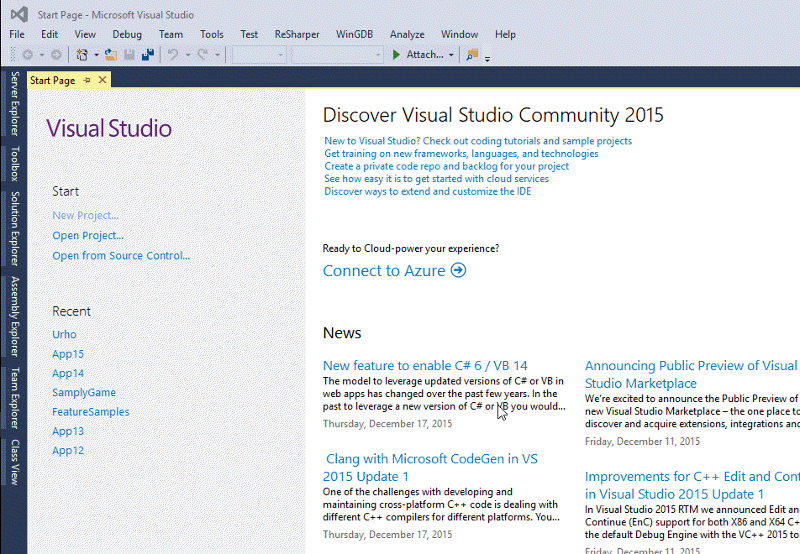UrhoSharp is a lightweight Game Engine suitable for using with C# and F# to create games that run on Android, iOS, Mac, Windows and Unix. The game engine is available as a portable class library, allowing your game code to be written once and shared across all platforms. UrhoSharp is powered by Urho3D, a game engine that has been under development for more than a decade. More information can be found in the UrhoSharp documentation. The bindings for Urho3D are licensed under the MIT license, as found on the LICENSE file.
Sample code lives in https://github.com/xamarin/urho-samples and repository has them as a git submodule. Samples use UrhoSharp via nuget.
- Available on NuGet: http://www.nuget.org/packages/UrhoSharp
- Install into your PCL project and Client projects.
To help developers get up and running quickly with UrhoSharp we are providing a solution template for Visual Studio (you can find it in "Online templates" tab). This template consists of PCL+Android+iOS+Mac/Windows with a simple scene and some assets (Xamarin Studio templates will be available soon):
This is currently a little messy, so YMMV.
In order to compile binaries for all platforms you will need both Windows and OS X environment. Please follow these steps:
1. Install:
- XCode
- Xamarin Studio
- CMake (i.e. "brew install cmake")
- Mono 64 bit (i.e. "brew install mono")
- Command Line tools ("xcode-select --install")
- Android NDK (and ANDROID_NDK variable)
2. Clone the repository including submodules
git clone git@github.com:xamarin/urho.git --recursive
3. Compile Urho.pch
The following command will download Clang 3.7.0 if you do not have it installed, and use this to scan the Urho header files:
make PchMac
4. Generate C# bindings from Urho.pch
Open SharpieBinder/SharpieBinder.sln via Xamarin Studio and change .NET runtime to 64 bit mono (installed from homebrew is usually located in "/usr/local/Cellar/4.x.x.x"). Run SharpieBinder project and make sure it generated *.cs files in /bindings/generated dir.
Alternatively, you can do make SharpieBinder.
Then execute:
make ParseEventsMac
it should generate bindings/generated/events.cpp file
5. Compile UrhoSharp for Mac (fat dylib)
make Mac
it takes 5-10 minutes.
6. Compile UrhoSharp for iOS (fat dylib: i386, armv7, arm64)
make iOS
Note: Make sure you have an iOS 9.0 simulator target or modify SDKVER to target another simulator.
7. Compile UrhoSharp for Android (armeabi, armeabi-v7a, x86)
make -j3 Android
-j3 means a job per ABI. Make sure you have installed Android SDK and NDK (see MakeAndroid file)
8. Compile UrhoSharp for Windows (64 bit)
Obviously you can't do it on OS X so you have to switch to Windows environment. Make sure you have installed:
- Visual Studio 2015
- CMake
- GNU make (e.g. cygwin)
SharpieBinder doesn't work on Windows yet so you will have to copy bindings/generated folder from OS X environment to Windows.
Execute:
make Windows64 (or Windows32)
(you can also compile Android on Windows via "make Android") Then, open Urho.sln and compile MonoUrho.Windows project in Release configuration.
All compiled binaries could be found in the Bin/{platform} folder.


